Related Research Articles
Colin William George Gibson was a Canadian politician, land surveyor and lawyer.
Lieutenant General John Carl Murchie was a Canadian soldier and Chief of the General Staff, the head of the Canadian Army from December 27, 1943, until August 21, 1945.

Rear Admiral Desmond William Piers, was a rear-admiral in the Royal Canadian Navy. Born in Halifax and long-time resident of Chester, Nova Scotia, Piers served in the RCN from 1932 to 1967. In 1930, he was the first graduate of the Royal Military College of Canada to join the RCN. He became agent general of Nova Scotia in the United Kingdom in 1977.

The Kingston Royal Naval Dockyard was a Royal Navy Dockyard from 1788 to 1853 in Kingston, Ontario, Canada, at the site of the current Royal Military College of Canada.
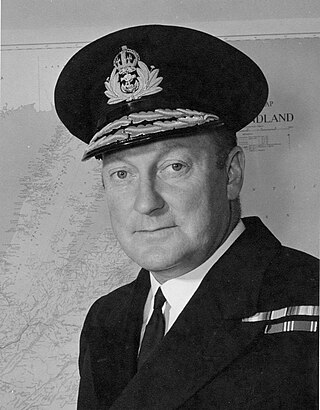
Rear Admiral Leonard Warren Murray, CB, CBE was an officer in the Royal Canadian Navy who played a central role in the Battle of the Atlantic, and was the only Canadian to command an Allied theatre of operations during World War II.

Admiral Percy Walker Nelles, was a flag officer in the Royal Canadian Navy (RCN) and the Chief of the Naval Staff from 1 January 1934 to 15 January 1944. He oversaw the massive wartime expansion of the RCN and the transformation of Canada into a major player in the Battle of the Atlantic. During his tenure U-boats raided the Gulf of St. Lawrence, Canadian Northwest Atlantic command was created, and the RCN provided up to 40% of all escort forces in the North Atlantic. His handling of the RCN's war effort had its opponents however, and he was removed from his post as Chief of the Naval Staff in January 1944. He was sent to London as Overseas Naval Attaché, coordinating RCN operations for Operation Overlord. He retired in January 1945 as a full admiral.

In the Canadian Forces, Maritime Forces Atlantic (MARLANT) is responsible for the fleet training and operational readiness of the Royal Canadian Navy in the Atlantic Ocean and Arctic Ocean. It was once referred to as Canadian Atlantic Station.

Vice Admiral Henry George DeWolf was a Canadian naval officer who was famous as the first commander of HMCS Haida during the Second World War.

Rear-Admiral Horatio Nelson Lay was a naval officer of the Royal Canadian Navy.
The Royal Naval College of Canada (RNCC) was established by the Department of the Naval Service after the formation of the Royal Canadian Navy (RCN) in 1910. The college was placed under the auspices of the Minister of Naval Service and controlled by the Director of the Naval Service, Rear-Admiral Charles Kingsmill. The initial goal was to train a new generation of Canadian naval officers for the RCN. The college existed from 1911 to 1922 and educated about 150 students until it was closed due to declining numbers and budget cuts by the government of Canada. As the RCN did not have large ships of its own other than HMCS Niobe and HMCS Rainbow, the cadets followed a course of study that would qualify them for eventual service on British warships. The graduated midshipmen were required to serve approximately one year of "big ship duty" as part of their training.

Vice-Admiral Philip Dean McFadden, CMM, CD is a retired officer of the Canadian Forces. He was chief of the Maritime Staff from 2009 to 2011 and last to hold the post before it was renamed to commander of the Royal Canadian Navy.
Rear-Admiral William Moss Landymore, OBE, CD was a Canadian naval officer. Born in Brantford, Ontario, Landymore joined the Royal Canadian Navy in 1936, but spent much of early career training with the Royal Navy. During World War II, Landymore returned to the Royal Canadian Navy and served aboard destroyers in the Battle of the Atlantic, surviving two sinkings. By the end of the war Landymore had taken a series of positions in Ottawa before returning to destroyer command during the Korean War. He was promoted through the ranks eventually becoming the first Commander of Maritime Command. Landymore became embroiled in a public feud with the Minister of National Defence following the Unification of the Canadian Armed Forces and resigned as a result. He died at Halifax, Nova Scotia.
Air Commodore Douglas Bradshaw, DFC, CD, ADC was a Canadian Air Commodore and educator. He was the Commandant of the Royal Military College of Canada from 1954 to 1957. He was the first president of Confederation College of Applied Arts and Technology from March 6, 1967, to 1974.
Captain John Moreau Grant CBE (1895–1986) was the first Commanding Officer of HMCS Royal Roads in Esquimalt, British Columbia. The Grant Building at Royal Roads University was named in his honour.
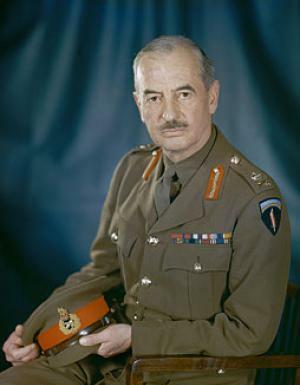
Lieutenant General Sir Arthur Edward Grasett, was a British-Canadian soldier who served with the British Army in Canada, the United Kingdom, British India and China.
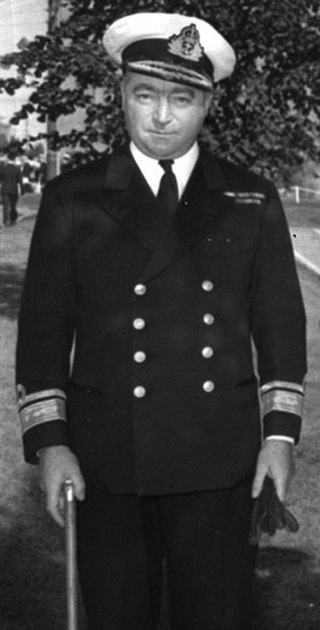
Vice-Admiral Howard Emerson Reid, CB was a Royal Canadian Navy officer who served as Chief of the Naval Staff from 28 February 1946 to 1 September 1947.
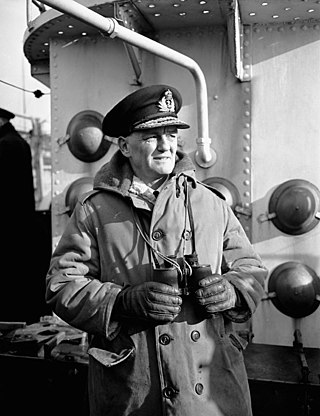
Vice-Admiral George Clarence Jones, was a Royal Canadian Navy vice admiral who served as Chief of the Naval Staff from 15 January 1944 to 28 February 1946.
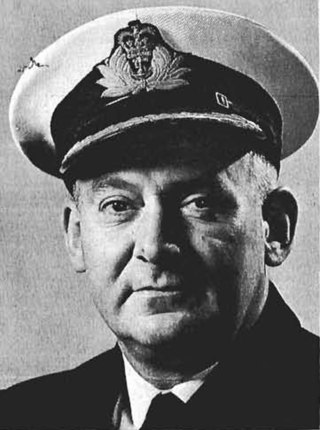
Surgeon Rear-Admiral Walter John Elliot QHS, MD, CM was the 22nd Canadian Surgeon General.

Navy bands in Canada are part of the Royal Canadian Navy's command structure and overseen by the Music Branch of the Canadian Forces and the Directorate of History and Heritage of the Department of National Defence.
Michael Hopper is a Canadian Forces officer who served as commander of the Naval Reserve from July 29, 2018 until 2021. Hopper holds the rank of commodore in the Royal Canadian Navy and also works as a teacher with the Ottawa-Carleton District School Board (OCDSB).
References
- ↑ "Commodore William P. Hayes (Ret'd)" . Retrieved 14 August 2013.
- 1 2 3 4 5 "Awards to the Royal Canadian Navy - H". Archived from the original on 2012-02-09.